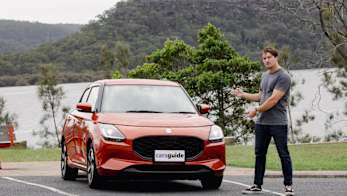Kia has just revealed its new EV3, the brand’s most affordable electric car yet.
The company also confirmed a red-hot dual-motor GT version will join the line-up at a later date.
Initially the Kia Seltos-sized EV3 will be available with a single electric motor sending 150kW and 283Nm to the front wheels.
The EV3 GT will add a second motor at the rear to deliver all-paw grip.
Kia hasn’t revealed outputs for the GT variant, but if it follows the same formula as the larger EV6 GT it could more than double the performance of the front-wheel drive model.
This would put it at more than 300kW and 500Nm.

The single motor EV3 can hit 100km/h from a standstill in 7.5 seconds, with the EV3 GT possibly dropping into the four second range.
Kia’s electric GT models aren’t just about raw power and come with a range of hardware updates to elevate their sporty character.

The EV6 GT has bigger, stronger brakes, uprated suspension, sport focused driving modes including a customisable setting, a steering tune to make it more decisive and agile and multi stage stability control settings.
It gets some cosmetic tweaks too, with snug fitting GT bucket seats and neon green exterior highlights.
Kia didn’t provide a date for the EV3 GT's release, but it is likely to land about a year after the standard vehicle, which is due to hit Australian showrooms in 2025.
The EV3 Long Range is the most likely candidate to form the base for the GT.
It has a big 81.4kWh battery that delivers a driving range of up to 600km in the single motor version. That number would drop significantly in an all-paw GT variant.
The company hinted it is aiming to price the EV3 between US$35,000 and US$50,000, which is about $50,000 and $75,000 in local currency.

Any GT variant would be at the top of the bracket or even pushed into the $80,000 range locally.
Charging the EV3 won't be as speedy as the bigger, more expensive models as it forgoes the 800-volt charging architecture in favour of a 400-volt set-up.
This means the 350kW maximum rate of Kia’s other vehicles is unlikely. The company said it can replenish the 81.4kWh battery from 10 to 80 per cent in 31 minutes, which would put the charge rate at about 120kW.



.jpg)





.jpg)





.jpg)
.jpg)
.jpg)



.jpg)
.jpg)
.jpg)


.jpg)